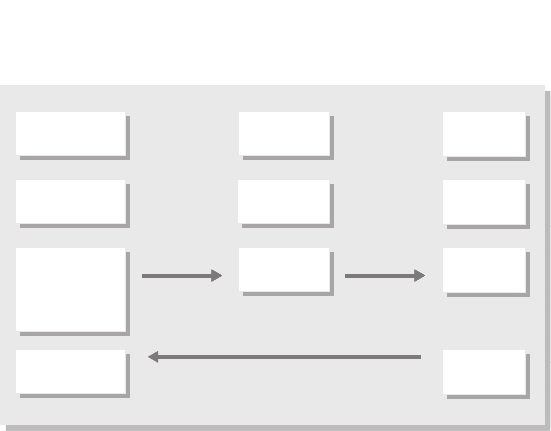Welcome to the jungle54
Another time Jerry explained how investment banks made their
money.
‘Different investment banks may look very similar to outsiders.
They normally split into three main areas of business: investment
banking and advisory, asset management and trading. Within these
broad groupings, however, there are many different functions.
Some banks may have a huge trading oor, others may be more
focused on asset management.
‘Investment banks carry out nancial advisory work for clients.
This section of the investment bank – sometimes known as
mergers and acquisitions or the investment banking division – is
responsible for raising capital via share and bond issues. These
transactions are extremely lucrative and banks will ght to the
death for a client mandate.’
It’s raining middlemen
‘Investment banking is a classic middleman business. You can think
of it as a simple diagram. On the left-hand side we have institutional
investors. Insurers, pension fund managers and the treasuries of big
businesses create huge volumes of work for investment banks. They
are cash-rich and need to invest. Institutional investors are assumed
to know their way around nance, so in most countries they will get
less protection from regulators even though the amount of money
at risk is massive.
‘Think of the pressure facing a pension fund. It receives your
pension payment, plus the payments of all the people in your
department, and all the other people in your rm, plus money
from people who work at suppliers and customers and compet-
itors, and their neighbours, wives, husbands and mates from the
gym. Every month the pension fund has a mountain of money
to invest.’
Jerry encouraged me to understand what kept Saiwai’s clients
awake at night. He used this diagram to show how investment
banks make money.

55Damn clients
‘Putting it in a bank account and playing golf for the next forty
years isn’t an option. Decisions on risk tolerance and asset
allocation have to be made. The pension fund will have a list of
investment banks which can advise it on equities, bonds, deriva-
tives and alternative investments.’
The lift stopped. Outside was the junior trader who I last saw
being torn apart by his boss for screwing up the breakfast order.
It was clear from the pile of pizza boxes balanced between his
burning hands that progress had not been rapid.
‘Who’s that?’ I asked.
Jerry pushed the shut button so the lift wouldn’t open. ‘He’s
called Jonathan Spurrier. He’s as much use as a chocolate
reguard.’ Without missing a beat Jerry continued with his
explanation.
‘Analysts are paid to generate ideas which salespeople can present
to clients. The investment bank makes money by charging
commissions to its clients. A dream call for a salesman is a switch,
where the pension fund sells Portuguese bonds and buys Danish
derivatives with the same money. This generates both a selling
and a buying commission for the bank – and, of course, the
salesman and the analyst.
Investors
Companies
Investment
banks
Have capital
Need to invest
Need
capital
Middlemen
Fund managers
Pension funds
Insurance
companies
Investment
Fees
Commissions
Dividends
Coupon interest
Returns
Welcome to the jungle56
‘Think about the right-hand side of my diagram. Here the pension
fund is offered bonds in the primary market. These businesses
desperately need capital. When the directors of MegaCorp A want to
buy MegaCorp B for trillions of dollars they don’t have, they call the
investment bank. MegaCorp A issues a jumbo bond with the help
of the bank. MegaCorp A contracts to pay a coupon to the pension
fund, which now has a source of income to pay to its pensioners.’
Shares are issued to the primary market and trade in the
secondary
I learned that when you buy a share you’re hoping to benet
from either a strong performance by the company or the stock
market as a whole. If a company becomes a leader in its sector –
as, for example, Apple is now – it will make greater and greater
earnings so people will pay more to buy a share. Greater earnings
will eventually lead to bigger dividends as well.
Jerry also taught me to distinguish between the primary and the
secondary market.
‘A private company does not have shares listed on a stock
exchange. Private companies are normally owned by relatively
few people and tend to expand organically, re-investing prots
to buy another shop or a new piece of machinery. But directors
might want growth to be more rapid or they might want to cash
in some of their own shares. This is the primary market, where
an investment bank turns the private company into a public
company. You may have heard this referred to as going public,
listing on the stock exchange and initial public offering (which is
always abbreviated to IPO).
‘The secondary market is where shares are bought and sold and
traded. Unkind critics call the secondary market a marketplace for
second-hand securities. Every time a share changes hands, there are
commissions to be made.’

57Damn clients
Day 2, 12.33pm – St Pancras Station, London
The train was met by screams and the ash of cameras. Anisa saw
a scrum of photographers and, just for a second, wondered if the
press had been alerted about the disappearance. But, with a sigh
of relief, she realised that lm stars, as well as ordinary mortals,
had been caught up in the no-ight ban. There was Tom Cruise
and there was Cameron Diaz and two steps behind them stood
Kevin Bacon.
Rumour had it that Bacon had lost an eight-gure sum after
investing in Bernie Madoff’s notorious funds. Madoff had
promised absolute safety with a high level of income. Why
hadn’t Madoff’s clients – property magnates, powerful politicians,
super-wealthy retirees – realised that such a combination was
impossible? And how many more frauds are left to be uncovered?
s
The Madoff scandal
The most famous inmate at Butner medium-security prison
is prisoner 61727–054, more commonly known as Bernie
Madoff. In December 2008 he confessed to his family that
his massively successful investment fund and brokerage had
been a fraud. He was sentenced to 150 years in Butner for
swindling $65 billion.
Madoff worked hard to appear respectable. As well as sitting
on the boards of many charities he was at one time a chairman
of the Nasdaq stock market and vice-president of the National
Association of Securities Dealers. Madoff’s reputation, credibility
and fantastic contacts meant very few sceptics. He kept his
clientele exclusive and many of his investors regarded an account
with Madoff as a badge of social acceptance. In retrospect, their
trust appears ludicrous.
The public side of Madoff’s business was on the 18th and 19th
floors of Manhattan’s Lipstick Building, where ringing phones and
shouting traders gave the impression of a healthy operation. But
a quick trip down the stairs to floor 17 would have revealed the
case study

Welcome to the jungle58
Anisa had come to St Pancras to make sure I hadn’t run.
The French police had accompanied me across the Channel. For
a horrible couple of hours I had thought they were going to put
me in the cells overnight. Instead they had dropped me off at a
small guest house in Nancy and picked me up in the morning. I
didn’t speak enough French to ask them whether I was a witness
or a suspect but they hadn’t felt the need to handcuff me.
We walked in silence to her car. How had I gone from being a
happy and contented training consultant to an accessory in a
murder case?
Anisa began. ‘I hope you appreciate how hard it was to get you
back. The French police are convinced you’re implicated.’
‘What do you want from me, Anisa? If you really thought I was
involved you’d have left me there.’
She bit her lower lip and looked in the rear view mirror. ‘OK.
shambolic, paper-strewn centre of the fraud where Madoff
employed a coterie of selected friends and close relatives.
Regulators first investigated Madoff’s funds as early as 2002
but failed to crack down on him. Indeed, Madoff was surprised
his crimes were not discovered earlier. A whistleblower at the US
Securities and Exchange Commission described the regulator as
being ‘staffed by 3,500 chickens’ who were no match for a sly fox
like Madoff.
Madoff ran his fund as a simple Ponzi scheme. As new clients paid
in funds, Madoff paid their money out to existing investors. For all
his talk of clever strategies and sophisticated trading algorithms,
very few real trades were actually conducted. Frauds don’t have to
be hi-tech or complex to be successful. There’s more information on
Ponzi schemes in Chapter 18.
Weird fact – Madoff has a couple of new prison nicknames. His
fellow con-artists call him either ‘The Godfather’ or ‘The Don’ in
recognition of his criminal skills.
s
..................Content has been hidden....................
You can't read the all page of ebook, please click here login for view all page.
